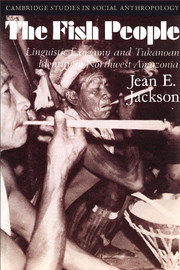Book contents
- Frontmatter
- Contents
- List of figures, maps, and tables
- Preface
- Acknowledgments
- Note on orthography
- 1 Purpose and organization of the book
- 2 Introduction to the Central Northwest Amazon
- 3 The longhouse
- 4 Economic and political life
- 5 Vaupés social structure
- 6 Kinship
- 7 Marriage
- 8 Tukanoans and Makú
- 9 The role of language and speech in Tukanoan identity
- 10 Male and female identity
- 11 Tukanoans' place in the cosmos
- 12 Tukanoans and the outside world
- 13 Conclusions: themes in Tukanoan social identity
- Notes
- Glossary
- References
- Index
- CAMBRIDGE STUDIES IN SOCIAL ANTHROPOLOGY
4 - Economic and political life
Published online by Cambridge University Press: 05 June 2012
- Frontmatter
- Contents
- List of figures, maps, and tables
- Preface
- Acknowledgments
- Note on orthography
- 1 Purpose and organization of the book
- 2 Introduction to the Central Northwest Amazon
- 3 The longhouse
- 4 Economic and political life
- 5 Vaupés social structure
- 6 Kinship
- 7 Marriage
- 8 Tukanoans and Makú
- 9 The role of language and speech in Tukanoan identity
- 10 Male and female identity
- 11 Tukanoans' place in the cosmos
- 12 Tukanoans and the outside world
- 13 Conclusions: themes in Tukanoan social identity
- Notes
- Glossary
- References
- Index
- CAMBRIDGE STUDIES IN SOCIAL ANTHROPOLOGY
Summary
Daily patterns
With the exception of slothful anthropologists, everyone in the longhouse gets up at least an hour before dawn, blowing fires into life and bathing in the incredibly cold river water. Young men bathe together at this time, pounding the water in unison (which makes a sound similar to kettle drums), on some mornings playing the Yuruparí horns and taking plant purgatives as well. Breakfast, eaten about daybreak, consists of cazabe and quiñapira and occasionally includes leftovers from the previous day's meal. The beverage is mingão, a drink made with hot water and tapioca granules. At other times of the day fariña mixed with cold water will do, but a proper breakfast must include a hot drink. In one Bará myth, troubles begin with an angry wife refusing to serve her husband a hot drink in the morning.
Women leave for their fields at about eight o'clock in the morning, taking their small children with them. Older children play near the longhouse or by the river or look for adventure elsewhere. Some men go off to hunt, fish, or clear forest for a new manioc field while others occupy themselves at home with such domestic tasks as longhouse repairs, basketry, or coca preparation.
On a typical day, manioc processing takes up much of the afternoon for most women. The men who left to hunt or fish return in the late afternoon, bringing with them trussed game or gutted fish glistening on a canoe paddle.
- Type
- Chapter
- Information
- The Fish PeopleLinguistic Exogamy and Tukanoan Identity in Northwest Amazonia, pp. 39 - 68Publisher: Cambridge University PressPrint publication year: 1983



